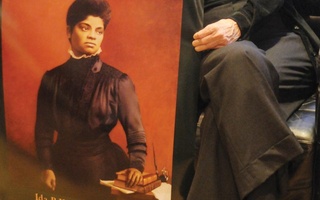Women made history on election night a week ago, ABC news correspondent Lynn Sherr told a packed room last night at the Cronkhite Graduate Center.
But what women will do with their new-found political strength remains to be seen, Sherr and her fellow panelists, Boston Globe columnist Ellen Goodman '63 and Jane Mansbridge, professor of public policy at the Kennedy School, added.
"For the first time in history, women elected the president," Sherr said, citing election results that show clinton earned 54 percent of the female vote.
"I say this with a great deal of gender pride," Sherr said. "But the question remains: If women are so powerful, why aren't we in power? And what do women want?"
Co-sponsored by the Radcliffe Public Policy Institute and the Committee on the Degree in Women's Studies, last night's panel attracted a crowd of more than 250 people, mostly women interested in the effect the elections will have on women's lives.
The hour-long discussion and subsequent town hall meeting were broadcast live by C-Span.
"We elected a different president than men, but women were also an easy make," Goodman said. "In terms of helping with the issues that affect women's lives, both parties offered very little that was concrete."
"It seems to me that we got very little in return for this victory," Goodman added.
Sherr also pointed out that despite the recent "year of the woman," women won few additional seats in Congress.
"Women are not going into politics anywhere near the rate that they're going into other professions," Goodman said. "Their first response is, 'It's such an awful thing to do.' It strikes a lot of them as very hard."
But Mansbridge said female politicians are necessary, especially when "uncrystallized issues" surface.
"With less crystallized issues, the apparent questions aren't out there," said Mansbridge, explaining that when Anita Hill called attention to sexual harassment, only female politicians were capable of completely understanding the issue.
"When an interest is uncrystallized, though, it's important to have someone who has some sense of where you're coming from picking up on these issues," Mansbridge said.
In the end, the panel advised audience members to exercise their political power fully.
"The trick to using our power seems to be to not let people forget how women voted," Sherr said in a final statement to the audience. "No matter how you do it, please vote next time."
Undergraduates in the audience said they agreed with the panelists, especially Mansbridge.
"A lot of times when I think of politics, it seems so deadlocked," said Melinda Li '99. "But [Mansbridge] seemed so excited that there are issues now that are still being crystallized, and we can give them shape."
Read more in News
CSA Hosts ConferenceRecommended Articles
-
Polls Shows Gender GapMen are more involved in the 2000 presidential elections than women but less likely to view the election's results as
-
Panel Says Women Affected ElectionSix panelists at a Radcliffe-sponsored roundtable discussion last night concluded that, both as candidates and as voters, women had a
-
K-School Initiative Brings Female Leaders to East CoastA group of international grass-roots leaders will explore the role of gender in conflict resolution as part of a recently
-
Closing the HKS Gender ImbalanceIn spite of efforts to raise awareness on the issue of gender imbalance, the percentage of female faculty at the Kennedy School—although improving from year to year—has remained very low over the past decade.
-
Harvard Professors, Students React to Congress' Cuts to Planned Parenthood FundingHarvard professors and students have expressed a variety of opinions about a controversial measure to cut federal funding to Planned Parenthood approved by the Republican-controlled House of Representatives last Saturday.
-
 Painting a New Path at the Kennedy School
Painting a New Path at the Kennedy School












